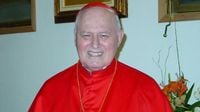In 1978, a pivotal moment in the history of the Catholic Church unfolded when Dom Aloísio Lorscheider, the then-archbishop of Fortaleza, Brazil, was on the brink of becoming Pope. Following the unexpected death of John Paul I, who served only 33 days, the conclave was tasked with electing a new leader for the Church. Among the candidates, Lorscheider garnered enough support, reportedly reaching two-thirds of the necessary votes, but ultimately declined the position, a decision that would reshape the future of the papacy.
The sudden vacancy left by John Paul I necessitated a swift conclave, and Lorscheider, a prominent figure in the Church, stood out as a serious contender. According to Frei Betto, a well-known theologian, Lorscheider's refusal was driven by health concerns; he had undergone eight bypass surgeries and feared that the demands of the papacy would be too great for him to bear. This choice not only altered the course of his life but also led to the election of Karol Wojtyła, who would become John Paul II, one of the longest-serving popes in history.
Dom Aloísio Lorscheider's influence on the Church extended beyond his brief candidacy. Born in Estrela, Rio Grande do Sul, he was appointed as the archbishop of Fortaleza in 1973 and later served in the same capacity in Aparecida. His leadership was marked by a commitment to social issues and the rights of the vulnerable, advocating for the end of torture during Brazil's military dictatorship and supporting the democratization of the country. In recognition of his contributions, he received the title of Doctor Honoris Causa from the State University of Ceará in 2005.
Despite his refusal to assume the papacy, Lorscheider's legacy continues to resonate within the Church. His decision to decline the role opened the door for John Paul II, whose pontificate lasted an impressive 26 years, 5 months, and 18 days. John Paul II's leadership was characterized by his efforts to foster interfaith dialogue and address global issues, but the shadow of Lorscheider's near-election remains a significant chapter in the Church's history.
Fast forward to the present day, and the Church still reflects on the significance of Lorscheider's legacy. As the conclave convened on May 8, 2025, to elect a new pope, Brazilian cardinals once again played a pivotal role. Among the seven Brazilian cardinals present was Dom Sergio da Rocha, the archbishop of São Salvador da Bahia, who was mentioned as a potential candidate. However, when asked about the possibility of becoming pope, he humbly stated that the decision rests “in the hands of God.”
The fact that Brazil has never had a pope is often attributed to various factors, including the historical dominance of European candidates and a conservative outlook among the College of Cardinals. The political and social landscape of Latin America also presents unique challenges that have influenced the selection process over the years. Lorscheider's experience serves as a poignant reminder of this complex dynamic: he had the votes and the support, yet he stepped back, allowing the Church to navigate its future under a different leader.
Dom Aloísio's story is not just about a missed opportunity; it encapsulates the intersection of faith, health, and leadership. His commitment to the Church and its followers remained unwavering, even after his refusal of the papacy. He continued to work tirelessly within the Archdiocese of Fortaleza, where he established eleven new parishes and engaged with various organizations dedicated to social justice and Christian unity.
One notable incident during his tenure occurred in 1994 when Lorscheider was kidnapped during a visit to the Paulo Sarasate Penal Institute in Aquiraz. He was taken hostage alongside 12 others, including priests and local officials, for a harrowing 20 hours. Remarkably, Lorscheider insisted on being the last to be released and later forgave his captors, showcasing his deep commitment to compassion and reconciliation.
Throughout his life, Lorscheider exemplified the qualities of a true leader in faith, advocating for the marginalized and standing firm in his beliefs even in the face of personal challenges. His refusal to accept the papacy, while a significant moment in Catholic history, was also a testament to his character and dedication to his health and responsibilities.
As the Catholic Church continues to evolve, the influence of figures like Dom Aloísio Lorscheider remains vital. His near-election as pope serves as a reminder of the potential for change and the importance of leadership that prioritizes the well-being of both the individual and the community. With the upcoming conclave, the hope is that the lessons learned from Lorscheider's story will inspire future leaders to embrace their roles with a similar sense of duty and compassion.
In reflecting on the legacy of Dom Aloísio Lorscheider, it becomes clear that his impact transcends his refusal of the papacy. He remains a symbol of hope for many, embodying the principles of faith, leadership, and social justice that the Church strives to uphold. As the conclave of 2025 unfolds, all eyes will be on the Brazilian cardinals, who carry forward the torch of Lorscheider's vision for a more inclusive and compassionate Church.






